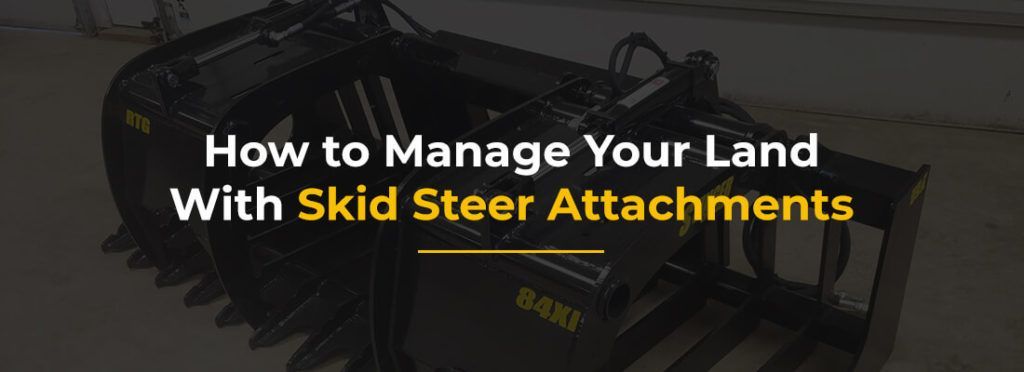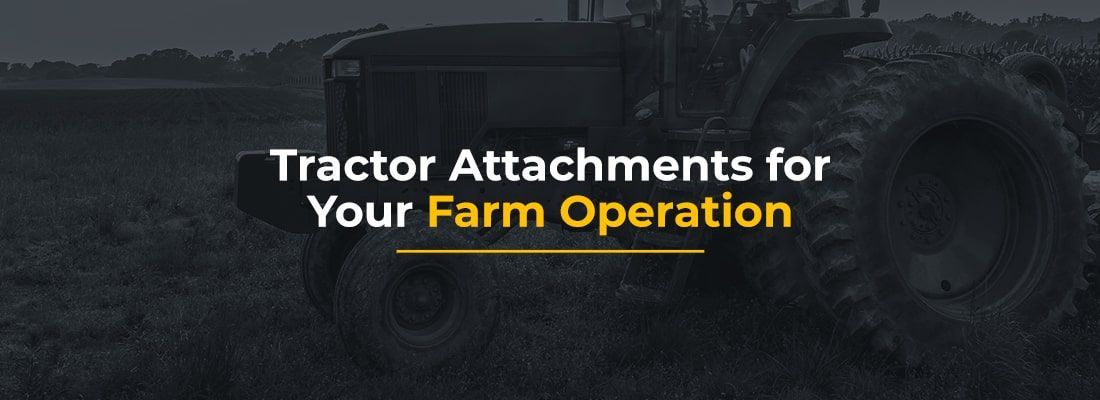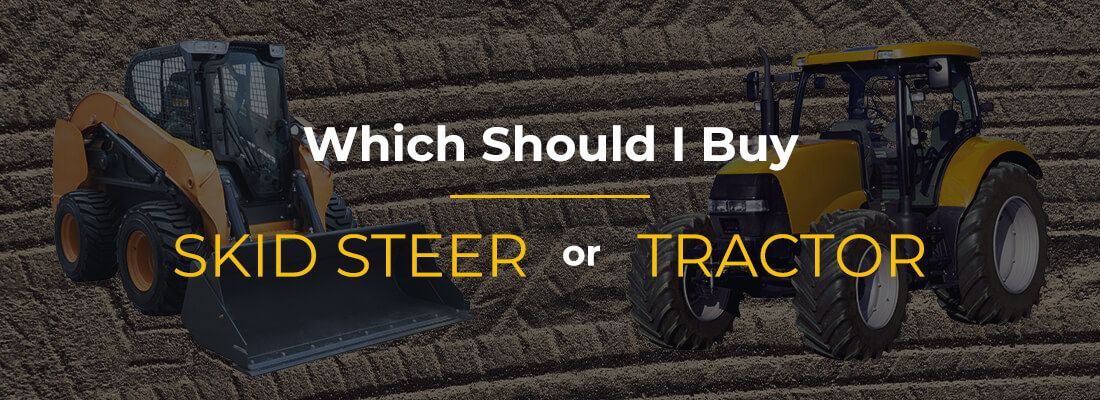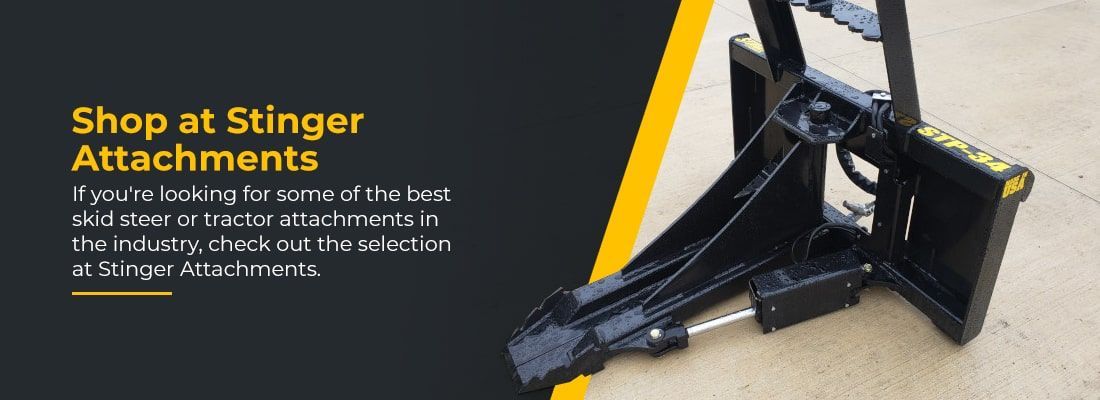Tips for Purchasing a Tractor
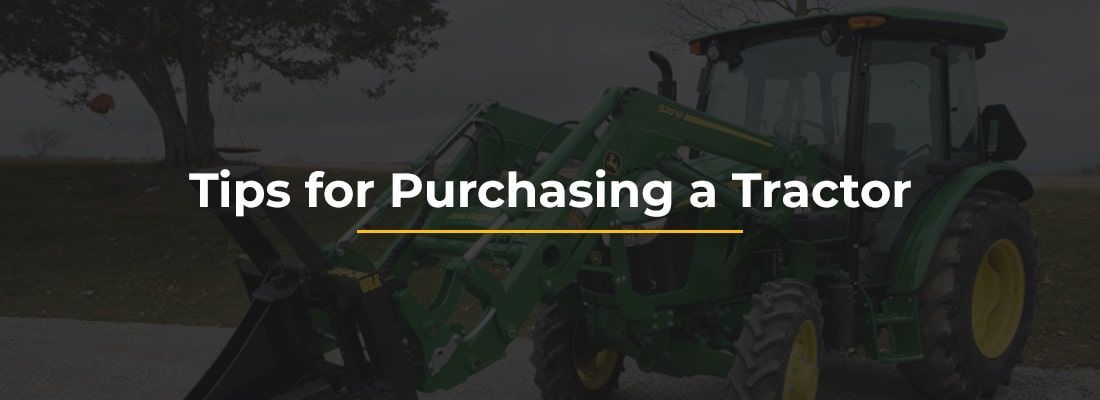
Tips for Purchasing a Tractor
There’s a reason kids often have an intense fascination with tractors — they’re powerful machines. However, in the adult world, tractors come with a lot of responsibility — in addition to a hefty price tag. Whether this is your first tractor or you’re looking to replace an old one, this article will guide you in comparing new vs. used tractors and deciding which type might be best for you.
Keep reading to discover some of the industry’s best tips for buying a tractor.
Choosing the Best Tractor for Your Application
There are many different types of tractors, but certain factors will influence what kind is best for you. Consider questions such as:
- What industry are you in?
- What will you mainly use your tractor for?
- What type of terrain do you primarily work with?
- What other types of equipment do you use?
- What is your budget for equipment and maintenance?
- What kinds of attachments will you need?
- How often will you use your tractor?
Recognize Your Needs
The type of tractor you’ll use should be dictated by your needs and industry. According to the United States Department of Agriculture (USDA), approximately 96% or 2.2 million farms are family-owned and -operated. If you operate a small farm — around 100 acres or fewer — you really only need one tractor to suit your needs. On the other hand, if you’re working a farm that’s 200 or more acres, you’ll need more power — and depending on your operations, possibly multiple tractors.
Keeping up with your operations and ensuring you can expand your farming business — if that’s something you’re looking to do — is an essential factor in preparing to buy a tractor. Sit down with your family and staff and perform a needs assessment to determine how your operations can benefit from purchasing a new or used tractor.
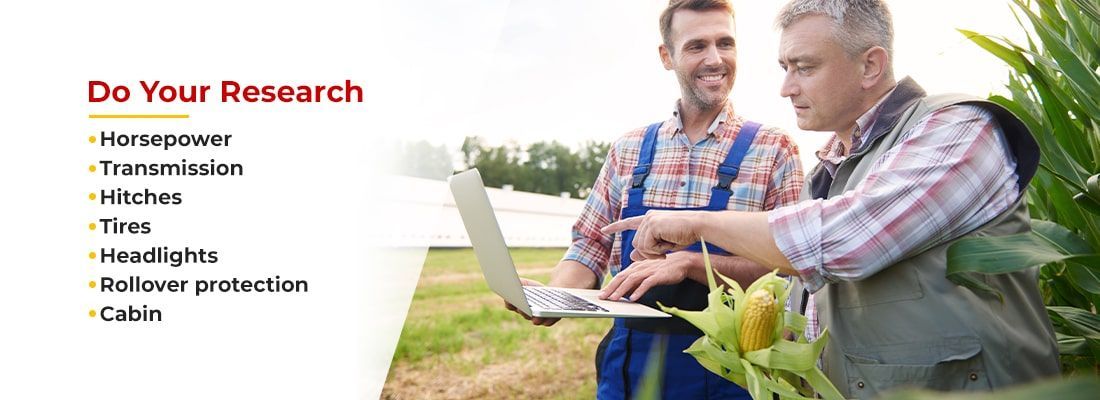
Do Your Research
If this is your first tractor, the research step should be the most important aspect of your preparations. To guide your research, consider these factors when looking at each type of tractor:
- Horsepower: A tractor’s horsepower refers to how much power the engine can produce to complete tasks. For larger acreage and more intense operations, you’ll want more horsepower. If you only plan to use small attachments and trailers, a lower horsepower tractor will work. While you don’t want to overestimate your power needs, you definitely don’t want to underestimate them, either.
- Transmission: Like with cars, you can choose between automatic and manual transmission options with tractors. Automatic or hydrostatic transmissions are attractive options because you don’t have to use the gear shift or clutch — the engine automatically adapts. However, manual transmissions offer you more control and longevity, as well as a lower price point.
- Hitches: The hitch is the part of the tractor you can connect attachments to. One of the most popular hitches is a three-point hitch, which uses a hydraulic lift system for raising and lowering the equipment.
- Tires: Your tractor should have high-quality tires to ensure you get traction in a wide variety of weather conditions and terrains. Remember that tires also have a load capacity, so ensure you have the right ones for the loads you’re planning to take.
- Headlights: In the dog days of summer, it might be best to leave the hardest work for the evening, when temperatures cool off. This means you’ll need powerful headlights on your tractor to ensure you have enough visibility when working in low-light conditions.
- Rollover protection: If your tractor rolls over, you want to ensure you or the operator is thoroughly protected from being crushed under the machine. The United States Department of Labor (USDL) reports that 44% of farm accidents are from tractor rollovers, so this is a crucial risk to protect yourself from.
- Cabin: You can often choose between open- and enclosed-cabin tractors. Some tractors come with cabin features that can enhance your comfort, such as heating and air conditioning. High-tech, expensive tractors might even have monitors in the cabin allowing you to control factors like speed, direction and attachments. With some models, you can even upload planting data to track your growing progress.
Should I Buy a New or Used Tractor?
When looking into how to buy a tractor, you will inevitably come across this question. While the bargain hunter in you may immediately want to pursue used tractor options, looking at both new and used tractor buying guides is vital to understanding all your options. Fortunately, you can find everything you need to know about buying new or used tractors here.
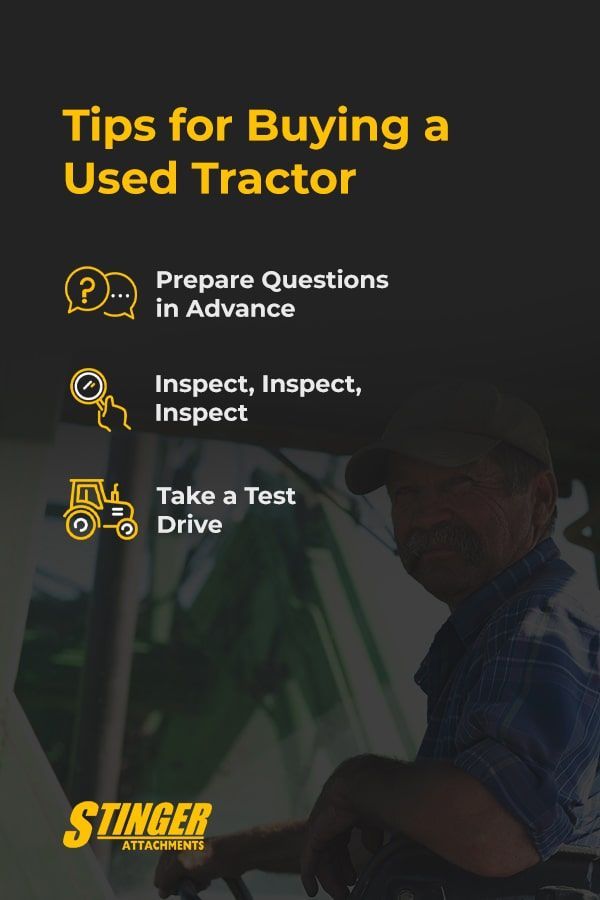
Tips for Buying a Used Tractor
Used tractors are a great option when they are well-maintained and have low usage hours. When approaching the used-tractor buying process, remember that tractors are not the same as cars. While a 30- to 40-year-old car might seem like an ancient relic — or be an enormously expensive classic model — a tractor that old might be just the right fit for what you need.
Considering your budget might be the most important factor in determining if a used tractor is right for you. While there is often a significant price difference between new and used models, you still need to prepare to spend upward of a thousand dollars to get a quality tractor that’s safe and reliable.
1. Prepare Questions in Advance
Whether you are going through a dealer or an independent seller, be sure to come to the meeting with questions, such as:
- How much power does the tractor offer?
- What kind of transmission does it have?
- Is the tractor a two- or four-wheel drive?
- What kind of hitch does it have?
- Does the price include any attachments?
- What are the controls like?
- Does the cabin have any comfort features like heating or AC?
In addition to these questions, you’ll also want to ask for a complete history of the tractor. This history will give you an idea about how the tractor has been treated in its time and whether it’s a worthwhile investment. Questions to lead you in this investigation include:
- Did the seller buy the tractor new? How many owners has it had?
- What is the maintenance history? Have any major parts been replaced?
- Who has performed maintenance on the tractor? Was it a dealership mechanic or an individual technician?
- Have previous owners made any modifications to the original configuration?
- How old are the tires?
The answers to these questions will help guide you in determining the tractor’s quality and whether you might have to invest more money in maintenance costs. If you count yourself as a handy do-it-yourselfer, buying a tractor that needs some work might not faze you as much, since all you’ll need to pay for is parts.
2. Inspect, Inspect, Inspect
In addition to asking the seller about the owner and maintenance history, you’ll also want to perform a thorough inspection. You can do this inspection yourself if you feel confident in your ability to evaluate a used tractor, but having a licensed mechanic or another knowledgeable expert on your side is a great plan.
When performing an inspection, follow this checklist to be sure you’re covering everything needed:
- Exterior: Look at the tractor’s exterior to check for obvious signs of wear like faded or chipped paint, dents, rust, cracks, broken down rubber or plastic, worn tire tread and drops or pooling fluid underneath the tractor. Also, be sure to check the seat and other cabin components.
- Engine: For the engine, check all over for any apparent leaks or low fluid levels. Be sure to look over the fan belts, filters, tubes and radiator components.
- Hydraulics: You’ll also want to glance over the hydraulic system for any obvious issues with the levers, pivot pins, spools or couplers.
3. Take a Test Drive
Once you’ve done your visual inspection, ask if you can test drive the tractor before purchase. You likely won’t be able to get far on a tractor, so most owners should be okay with you taking a spin. If the tractor has two seats, they may even let you ride along to show you how to operate the controls.
While the tractor is running, you can check how the gears shift, if the instruments work properly, if the brakes are in good condition and how the wheels and tractor itself feel when you’re driving it.
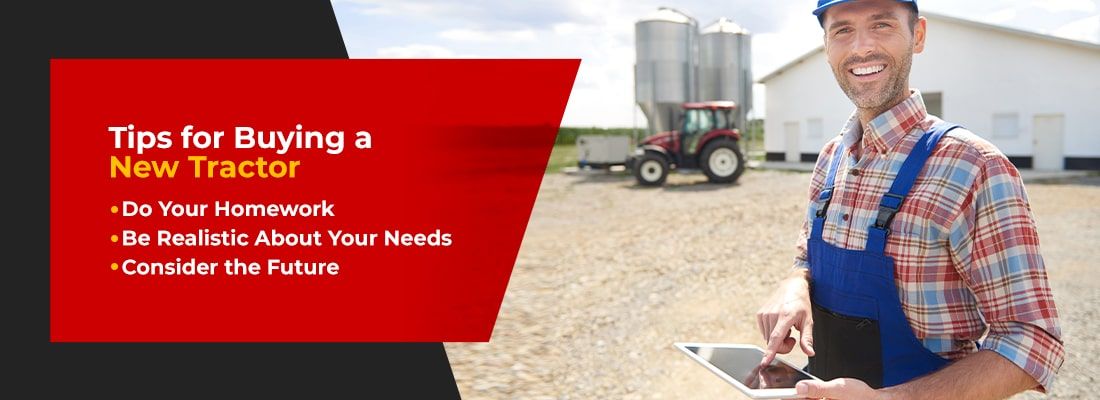
Tips for Buying a New Tractor
When buying a new tractor, you will take a different approach than if you’re buying a used one. Most new tractors will come from dealers, manufacturers or retailers. Often, they’ll have a dedicated salesperson, much like in the car-buying process, who will guide you through different models. While they can navigate your decision-making process, always remember they are there to sell you their products.
Essential skills for buying a tractor or making any major purchase include paying close attention to small details, standing your ground, asking questions and looking to the future. Here are the top three tips to utilize when purchasing a new tractor:
1. Do Your Homework
Make sure you research into what kind of tractor will suit your needs. Coming to the showroom or retail store with an idea of what tractor you require can help narrow down your options in the decision-making process and might also help streamline the final sale.
The first aspect of research you’ll want to do concerns your own business or operations. Construct a rough profile of your needs, including:
- The property size.
- How often you will use your tractor.
- Your projected operations growth.
- Your property’s terrain.
- Your region’s climate.
- What time of year you are busiest.
Having a profile of your own operations will help you approach the research process with more focus. Certain tractors are better for different types of work and different working conditions.
Next, you will want to set a budget for yourself, remembering that a new tractor can be an investment akin to buying a house. Keep in mind there are often financing options or loans available if you’re looking to purchase a tractor. With a good credit score, you could qualify for long-term loans with low interest rates.
2. Be Realistic About Your Needs
While the preparations for buying a new tractor can be extensive, showing up with the right attitude can have a great impact on your results. Because it’s their job, a salesperson may try to upsell you or convince you that you need additional products or add-ons. While their pitch may be very convincing, always remember you are ultimately in charge of your purchasing decision. No matter how hard they put the sell on you, be firm about what you need and how much you’re willing to spend.
Also, don’t be afraid to take the time to consider your options carefully. With a purchase as big as a tractor — and they can run into the hundreds of thousands of dollars — you want to make sure you’ve weighed all the relevant factors and made an informed decision that will be best for you and your operations.
3. Consider the Future
When investing in a tractor, consider what your future needs will be. If you have a small farm or business and don’t plan on expanding for whatever reason, you’ll want to find a tractor that perfectly suits your current conditions. However, if you do plan to grow your land or operations, choosing a tractor while having the future in mind will prove to be the best investment.
Slightly overestimating your needs can be helpful, especially since it may account for any increase in business or usage that you could experience in the future. The risk of underestimating what you will need from your tractor is that it may impinge on your ability to meet demand and keep up with your growth.
Buying a Tractor: Frequently Asked Questions
Below, explore some frequently asked questions that come with buying a new or used tractor and gain insight from their answers.
1. Can I Get Financing for a New or Used Tractor?
Yes, you can get financing for both new and used tractors from most retailers. If buying a used tractor from an individual seller, you could also get a loan.
2. Do Tractors Come With Warranties?
Yes, new tractors often come with warranties, and some dealerships may even offer warranties on used tractors if all the parts are certified to be in working order.
3. Where Should I Service My Tractor?
Some warranties require that you only receive warranty work from certified or authorized retailers. However, if you’re not getting warranty work, always ensure the technician working on your machine has the proper training and education.
4. What Kinds of Attachments Can I Get for My Tractor?
Depending on the style of your tractor hitch, you might be able to use skid steer attachments on it. If you’re considering buying a tractor, knowing this could influence your decision.
Shop at Stinger Attachments
If you’re looking for some of the best skid steer or tractor attachments in the industry, check out the selection at Stinger Attachments. We offer world-class customer service and prioritize your needs to help you find the highest-quality product for your applications. To learn more about our attachments, including industry-leading grapples and tree pullers , or to get information about financing, contact our team.
The post Tips for Purchasing a Tractor appeared first on Stinger Attachments.
You might also like
